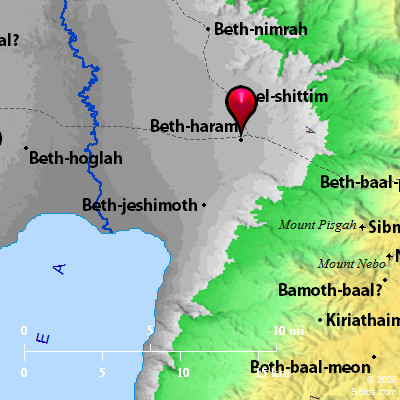Atlas  Beth-haram and surrounding area Maps Created using Biblemapper 3.0 Additional data from OpenBible.info You are free to use up to 50 Biblos coprighted maps (small or large) for your website or presentation. Please credit Biblos.com. Occurrences Joshua 13:27 and in the valley, Beth Haram, Beth Nimrah, Succoth, and Zaphon, the rest of the kingdom of Sihon king of Heshbon, the Jordan's bank, to the uttermost part of the sea of Chinnereth beyond the Jordan eastward.Encyclopedia BETH-HARAMbeth-ha'-ram (beth haram; Baitharan; Codex Alexandrinus, Baitharra; the King James Version wrongly, Beth-Aram): An Amorite city taken and fortified by the Gadites (Joshua 13:27 Numbers 32:36; in the latter passage the name appears as Beth-haran, probably the original form). It corresponds to Bethramphtha of Josephus (Ant., XVIII, ii, 1), which, according to Eusebius, was the name used by the Syrians. Here was a palace of Herod (Ant., XVII, x, 6; BJ, II, iv, 2). Eusebius, Onomasticon says it was called Livias. Josephus says it was fortified by Herod Antipas, who called it Julias for the wife of Augustus (Ant., XVIII, ii, 1; BJ, II, ix, 1). The name would be changed to Julias when Livia, by the will of the emperor, was received into the Gens Julia. It is represented by Tell er-Rameh in Wady Chesban, about 6 miles East of Jordan. BETH-A'RAM, this is the spelling as it occurs in our English translation, but it is Beth-haram in the Hebrew; Dr. Merril has given good reasons for placing it at tell er Rama, 5 1/2 ms. n.e. from the Dead Sea. In Numb. 32:36 it is Beth-haran. Strong's Hebrew H1027: Beth Haram"house of the height," a place East of the Jordan |



